Aston University
Aston University (abbreviated as Aston. for post-nominals) is a public research university situated in the city centre of Birmingham, England. Aston began as the Birmingham Municipal Technical School in 1895, evolving into the UK's first college of advanced technology in 1956.[7] Aston University received its royal charter from Queen Elizabeth II on 22 April 1966.
 Arms of Aston University | |
Other name | Aston |
|---|---|
| Motto | Forward |
| Type | Public |
| Established | 1895 – The Birmingham Municipal Technical School 1927 – Birmingham Central Technical College 1951 – College of Technology, Birmingham 1966 – gained university status by royal charter[1] |
| Endowment | £1.47 million (2022)[2] |
| Budget | £197.7 million (2021–22)[2] |
| Chancellor | Sir John Sunderland |
| Vice-Chancellor | Aleks Subic |
| Students | 15,500 (2017–18)[3] |
| Undergraduates | 11,935 (2017–18)[4] |
| Postgraduates | 3,565 (2017–18)[5] |
| Location | , 52.4860°N 1.8895°W |
| Campus | Urban 60 acres (24 hectares)[6] |
| Colours | Black and Red
|
| Affiliations | ACU EQUIS EUA Universities UK AACSB M5 Universities AMBA |
| Mascot | Cyril the Squirrel (now deceased ) |
| Website | www |
 | |
Aston pioneered the integrated placement year concept over 50 years ago,[8][9][10] and more than 73% of Aston students take a placement year, the highest percentage in the UK.[11] The annual income of the institution for 2021–22 was £197.7 million of which £19.3 million was from research grants and contracts, with an expenditure of £219.4 million.[2]
In 2020, Aston University was named "University of the Year" by The Guardian,[12] and the newspaper also awarded Aston Students' Union its "Buildings That Inspire" award.[13] The Times Higher Education Awards named Aston University as its "Outstanding Entrepreneurial University" in 2020.[14]
In September 2021, Aston was shortlisted for University of the Year in the Times Higher Education Awards 2021.[15]
History
Predecessor institutions
The origins of Aston University are a School of Metallurgy formed in the Birmingham and Midland Institute in 1875. The Birmingham Municipal Technical School separated from the Institute in 1895, teaching chemistry, physics, metallurgy and electrical engineering; it expanded and by 1917 was also teaching botany and other subjects to trainee teachers. In 1911, commercial classes were introduced and grew into an independent School of Commerce by 1916.[16] The school changed its name in 1927 to the Birmingham Central Technical College,[16] to reflect its changing approach to teaching technology.
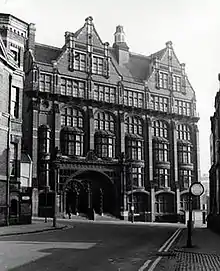
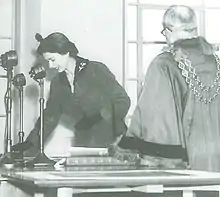
In 1951, the Technical College was renamed the College of Technology, Birmingham,[16] and work began on the Main Building at Gosta Green. In 1956, it became the first elite designated college of advanced technology and underwent a major expansion.[16] It moved into buildings that were constructed between 1949 and 1955 to a design by Ashley & Newman. Princess Margaret laid one of the first foundation stones at the base of the new building in 1951. The building is one of Europe's largest freestanding brick buildings.[19] In 1955, the College of Advanced Technology was opened by Her Majesty The Queen.[20] The college expanded again to a design by the City Architect of Birmingham Alwyn Sheppard Fidler between 1957 and 1965.[21]
University status
It officially became the University of Aston in Birmingham on receipt of its royal charter on 22 April 1966, and the first chancellor of the university, Lord Nelson of Stafford, was installed on 10 May. The charter of the university outlines objectives appropriate to a technological university: "to advance, disseminate and apply learning and knowledge by teaching and research, for the benefit of industry and commerce and of the community generally: and to enable students to obtain the advantage of a university education, and such teaching and research may include periods outside the University in industry or commerce or wherever the University considers proper for the best advancement of its objects." The emphasis given to the sandwich course system, and the maintenance of strong links with industry, arises naturally from the institution's history. The motto of the university is the same as that of the City of Birmingham – Forward.[22]
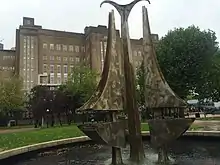
In 1983, Aston University, in partnership with Birmingham City Council and Lloyds Bank, established Birmingham Technology Ltd., which manages the Aston Science Park adjacent to the university site. The establishment of the Aston Science Park and Aston University's contribution to the city of Birmingham was fully recognised when the area was granted its own postal address "The Aston Triangle" in 1984, emphasising the campus as an official district of Birmingham. The logo of the establishment takes from the shape of the area.[23]
2000 to present
Aston University hosted the British Science Festival in September 2010, said to be Europe's largest public science event.
Since May 2011, Sir John Sunderland has been the Chancellor of Aston University.
The university is a lead sponsor of Aston University Engineering Academy, a university technical college (UTC) which opened in September 2012. The UTC is for students aged 14 to 19 wishing to pursue further study and careers in engineering, and is located at the edge of the Aston University campus.[24]
In October 2014, Aston announced plans to launch Aston Medical School in October 2015.[25] The university also announced a £35 million cash injection for a major upgrade of the campus, including a new £19 million revamp of Aston Business School and improvement work to the Aston Institute of Photonic Technologies and the School of Languages and Social Sciences.[26]
In February 2017, Aston University launched its online programme website. Four of their MSc programmes are offered 100% online to students in the UK and worldwide, including the Aston Business School's MBA.
In July 2017, Aston became the first University in the UK to have degree apprenticeship graduates.[27][28] Aston began working in close partnership with Capgemini, to create the first degree apprenticeship: Digital and Technology Solutions in 2012.[29]
In 2021, the university announced plans to close its Department of History, Languages and Translation, focusing instead on health, engineering, and business. This decision led to protests from members of the university, as well as humanities scholars broadly.[30][31] Professional groups, including the Royal Historical Society and the American Historical Association, condemned the move, and public figures, including Sir Keith Burnett and Shadow Education Secretary Kate Green criticised the university leadership.[32][33][34][35][36] Facing public opposition and protests from staff and students, university officials reversed their position and agreed to save the History programme, although cuts to language instruction would continue.[37]
Campus
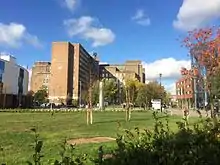

Established in 1895 as the Birmingham Municipal Technical School,[38] The university is situated on a 60-acre campus at Gosta Green, in the city centre of Birmingham, England.[39] As well as being home to over 3,000 students, the Aston University campus has the following amenities available: sports centres, swimming pool, 120 station gym, library, cafés, restaurants, pubs, shops, travel centre, hairdresser, health centre, dentist, places of worship, opticians, a bank, automated teller machines and plenty of outside space.
Aston University Library is on four floors and contains over 250,000 books, 800 current printed periodicals and has over 700 reader places. It provides online access to over 40 electronic databases and more than 3,400 electronic journals. The library is open 24 hours a day to Aston students and staff during exam time, and on average, around 12 hours a day during term time.
Around the campus there are also various open-access IT suites, offering computer and internet access 24 hours a day, seven days a week. They offer access to a range of software packages, database systems and computer-aided learning materials.
Sports
The Aston's sports facilities include a 25 m swimming pool, sauna and steam room, two sports halls, 120-station gym, weights and fitness rooms, two-storey dance studio and 35 sports clubs. The campus also has two 3G floodlit sports pitches. Clubs train and compete, many in the British Universities and Colleges Sports (BUCS) Leagues. Off campus the university manages a 40-acre sports ground with floodlit pitches, pavilion for all outdoor sports.
Organisation and administration
During 2020, Aston restructured its schools into three colleges, notably merging the School of Languages and Social Sciences with Aston Business School, and Aston Medical School with the School of Life and Health Sciences. The resulting colleges, schools, and departments are as follows:
College of Business and Social Sciences
- Aston Business School
- Accounting
- Economics, Finance, and Entrepreneurship
- Marketing and Strategy
- Operations and Information Management
- Work and Organisation
- Aston Law School
- School of Social Sciences and Humanities
- English, Languages and Applied Linguistics
- Sociology and Policy
- Politics, History and International Relations
College of Engineering and Physical Sciences
- School of Computer Science and Digital Technologies
- Electrical and Computer Engineering
- Mathematics and Data Science
- Computer Science and Cybersecurity
- AI and Robotics
- School of Engineering and Technology
- Mechanical Engineering and Design
- Biomedical Engineering
- Aston Foundation Centre
- Aston Professional Engineering Centre
- School of Infrastructure and Sustainable Engineering
- Chemical Engineering and Applied Chemistry
- Engineering Systems and Supply Chain Management
- Civil Engineering
College of Health and Life Sciences
- School of Biosciences
- Aston Medical School
- School of Optometry
- Audiology and Healthcare Sciences
- Aston Pharmacy School
- Neuroscience
- School of Psychology
Coat of arms
The university's arms were granted on 18 March 1955 by Garter, Clarenceux and Norroy and Ulster kings of Arms to the Birmingham Corporation, for use by the former College of Technology. They were designed to show the college's connection with the city and with the teaching of technology. The arms consist of a shield and crest. The shield has two sections – the field (the main background) which is coloured blue and a chief (the broad band across the top of the shield) of silver. On the field is a diagonal line of five gold diamonds joined one to the other, similar to the first quarter of the Arms of the City of Birmingham and incorporated in the Arms of the college to show its connection with the city. This was adopted by the family of Birmingham which derived its name from the then hamlet of Birmingham, and provided the Lords of the Manor from the fourteenth to the sixteenth centuries. On the chief is depicted an open book bound in red placed between two black hammers, showing the connection of the university with technology, the book representing learning and the hammers engineering and allied trades.
The crest is also designed to stress the pursuit of knowledge. It consists of a red torch held erect by a forearm between two branches of gold laurel. Having been originally worn on the helmet of a fully armed person, the crest is always placed on the top of the helm. The method of joining the crest to the helm was usually concealed by decoration and, in the university's arms, this is effected by the use of a wreath and a crown. The wreath is silver, red and black, these colours being taken from the shield. It is surmounted by a mural crown (resembling a wall), which is reserved in modern grants for persons and organisations connected with public corporations. The cloth mantling which hangs down from the top of the helm is the survival of the cloak which was originally worn to protect the armour, coloured in the two principal colours of the shield, blue and gold.[40]
In 2016, to mark the 50th anniversary of the university, Her Majesty's College of Arms granted the favour of supporters to Aston University's arms, following a request from the Vice-Chancellor, Julia King, the Baroness Brown of Cambridge. On 29 September, during a service at St Phillips Cathedral, The Letters Patent was formally presented to Aston University by the York Herald, Michael Peter Desmond O'Donoghue Esq.. The arms are supported by a Canada goose and a red squirrel. The Canada goose represents the family of geese living on the university campus. The squirrel is the crest of the arms of Aston Manor and is a rebus. (The picture is a pun on the persons name. The owners of Aston Manor were the Holte family and a squirrel's nest is called a holt). This explains the ancient connection between the squirrel and Aston. The animal also appears on the university mace and on the chancellor's chain of office. This chain was originally the property of the mayor of Aston Manor. The gorse around the animals' necks is a reference to Gosta Green. During the 18th century, it was known as Gostie Green, this combined the name of the landowner (William de Gorsty) with the local plant called 'gorse' [41]
Academic dress



The academic dress for graduates of the university is as follows:
- Bachelor of Science, Bachelor of Engineering and Master of Engineering
- Gown: Black stuff of special design, having coat-type sleeve, narrow facings which continue round the neck and with extra wide gathers round the back
- Hood: Black stuff, modified simple shape, faced inside for three inches with University lining
- Hat: Black mortar board
- Master of Science
- Gown: Black stuff of special design, having coat-type sleeve, narrow facings which continue round the neck and with extra wide gathers round the back
- Hood: Black stuff, modified simple shape, fully lined with University lining
- Hat: Black mortar board
- Master of Philosophy
- Gown: Black stuff of special design, having coat-type sleeve, narrow facings which continue round the neck and with extra wide gathers round the back
- Hood: Blue stuff, modified simple shape, fully lined with University lining
- Hat: Black mortar board
- Doctor of Philosophy
- Gown: Claret colour cloth robe, having coat-type sleeve, narrow facings which continue round the neck and with extra wide gathers round the back
- Hood: Modified simple shape, in University Red stuff, faced inside for three inches with University lining
- Hat: Black cloth bonnet with cord and tassels of University Red
- Doctor of Science
- Gown: Same shape as for Doctor of Philosophy but in University Red, with facings on collar of university lining and gold cuffs on sleeves
- Hood: Same shape as for Doctor of Philosophy but of gold silk and fully lined with University lining
- Hat: Black velvet bonnet with cord and tassels in gold
Academic profile
Rankings and reputation
| National rankings | |
|---|---|
| Complete (2024)[42] | 41 |
| Guardian (2024)[43] | 25 |
| Times / Sunday Times (2024)[44] | 38 |
| Global rankings | |
| ARWU (2023)[45] | 701–800 |
| QS (2024)[46] | 446= |
| THE (2024)[47] | 401–500 |
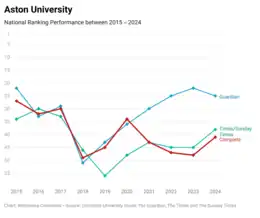
Aston University has been ranked in the top 25 of UK institutions in the 2022 Guardian University Guide.[48]
Aston University received a Gold award as part of the UK Government's Teaching Excellence Framework (TEF). The framework evaluates universities on criteria including teaching quality, learning environment and student outcomes, taking into account factors such as student satisfaction, retention rates and employment
Many factors make up the overall League Table rankings; Aston prides itself on consistently strong performances for the metrics related to student outcome successes. For example, in the 2021 Guardian University Guide Aston are ranked 11th in the UK for ‘Continuation’[49] which measures the proportion of students that drop-out of university following their first year. The 2021 Guardian Guide also ranks Aston joint 24th in the UK for ‘Value Added’[50] which compares student University grades against their expected grades based on entry qualifications.
In addition to this, the 2021 Times/Sunday Times Good University Guide ranks Aston University 31st in the UK for the proportion of students achieving a 1st or 2:1 degree classification,[51] and the same publication ranks Aston 30th in the UK for ‘Graduate Prospects’,[51] based on the proportion of graduates in a professional level job or further study within 15 months of graduation.
In addition to these immediate successes of Aston's students and graduates, there is also evidence of strong long-term benefits of Aston degrees, as the 2020 Longitudinal Education Outcomes study found that Aston graduates had the 15th largest median salary of all UK institutions 5 years after graduation.[52]
Research
In the latest 2021 Research Excellence Framework, which assesses the quality of research in UK higher education institutions, Aston is ranked joint 58th by GPA and 56th for research power (the grade point average score of a university, multiplied by the full-time equivalent number of researchers submitted).[53] In the 2008 Research Assessment Exercise (RAE), 88% of Aston academic staff were submitted for research assessment, one of the highest proportions in the UK. According to the RAE, the university's strengths include Business and Management, General Engineering, Subjects Allied to Medicine (Optometry, Biology, Pharmacy and Psychology), Languages and European Studies.[54]
Admissions
|
New students entering the university in 2020 had an average of 133 points (the equivalent of ABB-AAB at A Level).[57] According to the 2023 Times and Sunday Times Good University Guide, approximately 3% of Aston's undergraduates come from independent schools.[58]

Aston Business School
Founded in 1947[59] Aston Business School (ABS) is one of the largest and oldest business schools in the UK.[59][60] The school was ranked 8th in the UK and 33rd in the world by QS in 2012 and it is among the top 60 of business schools in the world to hold triple accreditation.[61] ABS was the first UK business school to be awarded the prestigious EQUIS accreditation, in 1999.[62] ABS is the first institution in the UK to be allied with Beta Gamma Sigma by establishing a BGS Collegiate Chapter. In 2006 it opened a new £22m extension including new study rooms and two new lecture theatres.[63]
Aston University is currently top 100 in the World for Business and Management in the 2020 QS World Subject Rankings[64] and top 200 for Accounting and Finance[65] in the same publication.
The business school's Masters Management course was ranked by the Financial Times in 2012 as 5th in the UK, 33rd in Europe and 36th in the world.[66] The paper also ranked Aston Business School as 4th in the world for careers in 2011.[67] In the school's most recent Research Assessment Exercise in 2008, all research areas submitted ranked in the top 9 in the UK. 45% of the research submitted was judged to be "excellent" or "world-leading".[68] Top 1% of Business Schools Worldwide with Triple Accreditation from AMBA, AACSB and EQUIS World Top 100 Universities for Business and Management Studies by QS Ranking (2019).[69]
Aston is 2nd in the UK for developing marketing professionals and 7th in the UK for finance professionals, based on the career outcome data of more than 313+ million LinkedIn members. The university was also 23rd in the UK for accounting professionals.[70] According to the Complete University Guide 2016, Aston is ranked 6th for marketing, 22nd for accounting and finance, 22nd for economics and 23rd for business and management studies in the UK.
Student life




Students' Union
Aston Students' Union (SU) (formerly Guild) is a non-profit, independent charity set up with the aim of representing and supporting its members who are primarily current students at Aston University. The SU operates a number of commercial and non-commercial services including; the Advice & Representation Centre (ARC), the Aston Athletic Union which supports the university sports clubs, the Aston Societies Federation which supports a large number of non-sporting societies, the SU Shop, Copyshop and B4 Bar. The SU is funded by grant income from Aston University and by funds raised by the SU's commercial services. The SU is led by a Trustee Board consisting of elected students and external trustees. Day-to-day management is by a team of permanent staff and by an elected student team called the Executive Committee. The SU building consists of 5 floors and is located in the centre of the Aston University Campus. The Union received a block grant of over £2.1 million from the university in 2022
On 29 November 2006, the students voted to disaffiliate the Guild (now Union) from the National Union of Students, but voted to re-affiliate on 26 November 2014.[71]
Student housing
All of the student housing that Aston owned was sold to UNITE Students in 2016. In the 1970s, three tower blocks containing student accommodation were constructed on Aston University campus; Dalton, Lawrence and Stafford Towers. In April 2007, Aston University submitted a planning application for demolition of the three 1970s towers and to replace them with new student accommodation blocks as well as apartments for tutors, retail units and administrative offices. Lawrence and Dalton Towers were demolished on 8 May 2011.[72] Stafford Tower, Gem Sports Centre and Lakeside Conference Centre were demolished on 27 April 2014 to make way for a new entrance to Aston University and a five-acre green space. The new landscaped area includes a new walkway into the university from the city centre and a pavilion, to be used for teaching and as a catering facility for outdoor events. The new buildings are named the William Murdoch, the James Watt, the Harriet Martineau and the Mary Sturge Residences.[73]
Another addition to Aston University student dwelling stock is the Lakeside complex on campus which was completed in August 1999.
Notable people
List of chancellors
- Lord Nelson of Stafford (May 1966 – September 1979)
- Sir Adrian Cadbury (September 1979 – September 2004)
- Michael Bett (September 2004 – May 2011)
- John Sunderland (Since May 2011)

List of vice-chancellors
- Peter Venables (academic administrator) (April 1966 – July 1969)
- Sir Joseph Pope (August 1969 – September 1979)
- Frederick W. Crawford (July 1980 – August 1996)
- Michael T. Wright (September 1996 – November 2006)
- Dame Julia King (November 2006 – September 2016)
- Alec Cameron (September 2016 – December 2021)
- Aleks Subic (August 2022 – present)[74]
Lecturers
- Geoffrey Vernon Ball – The first full-time lecturing professor of ophthalmics, (1948–1981)
Alumni
Academia and science
- Andrew Campbell, American computer scientist
- Stewart Clegg, Australian sociologist
- Paul Drayson, Baron Drayson, vaccine manufacturer and Minister of State for Science, Drayson Racing driver
- Veronica German, scientist, Member of the National Assembly for Wales
- Abdollah Jassbi, President of Azad University
- Rahul Potluri, founder of ACALM, doctor, researcher, scientist
- John Rickard, former Chief Economic Advisor to the British Government
- Adam Ryland, British programmer
- Kevin Warwick, Professor of cybernetics and Deputy Vice-Chancellor (Research) at Coventry University
- Steve Wharton, British academic
- David Willey, American physicist and entertainer
Arts and media
- Frankie Boyle, Stand-up comedian, television presenter
- Laura Jones, BBC journalist
- Ivan Noble, BBC journalist
- Nic Robertson, Senior International Correspondent at CNN
- Kate Walsh, television presenter
Business
- Viswas Raghavan, CEO of J.P. Morgan EMEA
- Ben Francis, Founder and majority shareholder of Gymshark
- Chris Banks, British businessman
- Rob Brighouse, Managing Director Chiltern Railways[75]
- Tony Hayward, Former chief executive of BP Group
- Ravi Kant, Vice Chairman of TATA Motors, India[76]
- Kevin Morley, Former Managing Director of the former Rover Group
- Rob Perrins, Managing Director of Berkeley Group Holdings
- Phil Popham, Global Operations Director for the global Jaguar Land Rover business
- Sir Arthur Smout, former Director-General of Ammunition Production for the British Armed Forces during the Second World War, and managing director of Imperial Chemical Industries metals group.
- Mike Wright, Executive Director Jaguar Land Rover[75]
- Liam Kelly, CFO of General Atomics
Politics
- Keith Bradley, Baron Bradley, Labour Party politician and life peer
- Anthony Cheung, Secretary for Transport and Housing in Hong Kong
- Simon D'Ujanga, State Minister for Energy in Uganda
- Malcolm Harbour, British politician
- Mohammad Nizar Jamaluddin, Former Chief Minister of the state of Perak
- Ashok Kumar, Labour Party politician
- Rachel Maclean, Conservative Party politician
- Terry Pitt, political adviser and former Member of the European Parliament
- Jeff Rooker, Baron Rooker, Labour Party politician
- Claire Curtis-Thomas, British Labour Party politician and former Member of Parliament (MP)
- Robert Walter, Conservative MP
- Salma Yaqoob, Leader and former vice-chairman of Respect – The Unity Coalition
Sports
- Rūta Bunkutė, IFBB/NPC Amateur fitness and figure competitor from Lithuania
- Gregor Townsend MBE, Scottish and British Lions Rugby Union Player[77]
Other
- Ernest Henry Wilson, notable plant collector and explorer
- Rick Stanton, cave diver.
- samardeep Singh, billionaire
See also
References
- "History and traditions". Retrieved 16 July 2015.
- "Financial Statement 2021–22" (PDF). Aston University. Retrieved 17 February 2023.
- "Financial Statement 2017–18" (PDF). Aston University. p. 9. Retrieved 26 August 2019.
- "Financial Statement 2017–18" (PDF). Aston University. p. 9. Retrieved 26 August 2019.
- "Financial Statement 2017–18" (PDF). Aston University. p. 9. Retrieved 26 August 2019.
- "Financial Statement 2017–18" (PDF). Aston University. p. 4. Retrieved 29 August 2019.
- Neil Handley. "Birmingham – Central Technical College and Aston University". Archived from the original on 11 July 2016. Retrieved 16 July 2015.
- "Aston University team up with tech firm for IT degree". birminghampost. 8 March 2014. Retrieved 16 July 2015.
- "50th Anniversary: Sir James Gracie Q&A". Archived from the original on 30 August 2015. Retrieved 27 October 2019.
- "Engineering graduates for industry" (PDF). Archived from the original (PDF) on 16 July 2015. Retrieved 17 October 2014.
- "Aston University". Complete University Guide. Retrieved 27 April 2014.
- "Aston University named Guardian's university of the year". The Guardian. 25 November 2020. Retrieved 7 December 2020.
- "Buildings that inspire: award winner and runners-up". The Guardian. 25 November 2020. Retrieved 7 December 2020.
- "Times Higher Education Awards 2020: winners announced". Times Higher Education (THE). 26 November 2020. Retrieved 7 December 2020.
- "Aston University shortlisted for the Times Higher Education (THE) University of the Year 2021 | Aston University". www.aston.ac.uk. Retrieved 12 August 2022.
- "History and Traditions". Aston University. 2008. Archived from the original on 19 December 2008. Retrieved 31 December 2008.
- "The Early Years". Retrieved 16 July 2015.
- "1950s". Retrieved 16 July 2015.
- "Midlands Business News New era at Conference Aston with the help of Overbury – Midlands Business News". Midlands Business News. Archived from the original on 17 July 2015. Retrieved 16 July 2015.
- "1950s". Aston.ac.uk. Archived from the original on 16 September 2015. Retrieved 27 April 2014.
- Foster, Andy (2007) [2005]. Birmingham. Pevsner Architectural Guides. Yale University Press. p. 195. ISBN 978-0-300-10731-9.
- "History and traditions". Aston.ac.uk. Retrieved 27 April 2014.
- "1980s". Aston.ac.uk. Archived from the original on 20 February 2016. Retrieved 27 April 2014.
- "Aston University | Aston University Engineering Academy". Auea.co.uk. Archived from the original on 17 October 2015. Retrieved 27 April 2014.
- "Aston Medical School FAQ". Archived from the original on 23 September 2015. Retrieved 16 July 2015.
- Griffin, Jon (17 October 2014). "New Aston University business school after £35m boost". Birmingham Post. Retrieved 16 July 2015.
- Offord, Paul (17 July 2017). "First degree apprentices in UK graduate". FE Week. Retrieved 13 March 2019.
- "First set of Capgemini degree apprentices graduate". ComputerWeekly.com. Retrieved 13 March 2019.
- Capgemini (7 September 2018). "Creating the first degree apprenticeship in digital and technology solutions". NCUB. Retrieved 13 March 2019.
- "History and languages closure at Aston University". University and College Union.
- "Studying history should not be only for the elite, say academics". The Guardian. 1 May 2021. Retrieved 1 May 2021.
- "RHS statement on the recent closure of UK History departments | RHS". royalhistsoc.org. Retrieved 27 September 2021.
- "The attack on the humanities at nonelite universities will do immeasurable damage (opinion)". www.insidehighered.com. Retrieved 27 September 2021.
- "History UK statement of solidarity with historians facing cuts at Aston University and London South Bank University". 23 April 2021. Archived from the original on 23 April 2021.
- Burnett, Keith (12 May 2021). "Universities' humanities provision should never become history". Times Higher Education (THE). Retrieved 27 September 2021.
- "Green quits event with vice-chancellors over course closures". University Business. 7 May 2021. Retrieved 27 September 2021.
- Scaglia, Ilaria (27 September 2021). "Facing Current Challenges Can Be A Vital Part Of Our Curriculum". Archived from the original on 27 September 2021.
- "Uni. finder > West Midlands > Aston University". HERO. Archived from the original on 12 April 2007. Retrieved 24 March 2007.
- Tarleton, Alice (1 August 2006). "Aston University". The Independent. A-Z Unis & Colleges. London. Archived from the original on 26 September 2006. Retrieved 2007-03-24.
- "Aston University Arms". Archived from the original on 17 July 2015. Retrieved 16 July 2015.
- "Aston University". Retrieved 30 October 2019.
- "Complete University Guide 2024". The Complete University Guide. 7 June 2023.
- "Guardian University Guide 2024". The Guardian. 9 September 2023.
- "Good University Guide 2024". The Times. 15 September 2023.
- "Academic Ranking of World Universities 2023". Shanghai Ranking Consultancy. 15 August 2023.
- "QS World University Rankings 2024". Quacquarelli Symonds Ltd. 27 June 2023.
- "THE World University Rankings 2024". Times Higher Education. 28 September 2023.
- "The best UK universities 2022 – rankings". The Guardian. Retrieved 19 November 2021.
- "The best UK universities 2021 – rankings". The Guardian. Retrieved 8 December 2020.
- "The best UK universities 2021 – rankings". The Guardian. Retrieved 8 December 2020.
- Times, The Sunday. "Good University Guide". The Times. ISSN 0140-0460. Retrieved 8 December 2020.
- "Graduate outcomes (LEO): Provider level data, Tax Year 2017–18". explore-education-statistics.service.gov.uk. Retrieved 8 December 2020.
- "REF 2021: Quality ratings hit new high in expanded assessment". Times Higher Education. Retrieved 18 February 2023.
- "Aston University". Retrieved 16 July 2015.
- "UCAS Undergraduate Sector-Level End of Cycle Data Resources 2022". ucas.com. UCAS. Show me... Domicile by Provider. Retrieved 8 February 2023.
- "2022 entry UCAS Undergraduate reports by sex, area background, and ethnic group". UCAS. 2 February 2023. Retrieved 2 February 2023.
- "University League Tables entry standards 2023". The Complete University Guide.
- "The Times and Sunday Times Good University Guide 2023". The Good University Guide. London. Archived from the original on 29 November 2022. Retrieved 16 February 2023.(subscription required)
- Archived 16 April 2008 at the Wayback Machine
- "The pope as a turnaround CEO". The Economist.
- "Global 200 Business Schools Report - TopMBA.com" (PDF). TopMBA.com. Archived from the original (PDF) on 12 October 2013. Retrieved 16 July 2015.
- Nick Pandya (16 February 2002). "Aston Business School". The Guardian. Retrieved 16 July 2015.
- "Aston Business School, Aston University | StudyLink". Pg.studylink.co.uk. Archived from the original on 20 October 2013. Retrieved 27 April 2014.
- "Business & Management Studies". Top Universities. 24 February 2020. Retrieved 8 December 2020.
- "Accounting & Finance". Top Universities. 24 February 2020. Retrieved 8 December 2020.
- "Business school rankings from the Financial Times – Aston Business School". Rankings.ft.com. Retrieved 27 April 2014.
- "Aston Business School is 4th in the world for careers". .aston.ac.uk. 19 September 2011. Archived from the original on 4 June 2013. Retrieved 27 April 2014.
- "Aston's performance in the Research Excellence Framework". Archived from the original on 26 December 2014. Retrieved 16 July 2015.
- "Aston University enters top 100 world ranking for Business and Management Studies". Retrieved 12 June 2019.
- "Aston rated 'Top 10' in LinkedIn Rankings". Archived from the original on 14 June 2015. Retrieved 16 July 2015.
- "Aston Students' Union re-joins NUS". NUS. Archived from the original on 29 November 2014. Retrieved 26 November 2014.
- "Aston University tower blocks demolished". BBC. 8 May 2011. Retrieved 27 April 2014.
- Archived 25 July 2013 at the Wayback Machine
- "Aston University appoints new Vice-Chancellor | Aston University". www.aston.ac.uk. Retrieved 12 August 2022.
- "Business Directors join Advisory Board". aston.ac.uk. 5 March 2013. Archived from the original on 2 February 2014. Retrieved 27 April 2014.
- "Ravi Kant – Forbes". People.forbes.com. 18 April 2012. Archived from the original on 20 April 2014. Retrieved 27 April 2014.
- "Aston University, Birmingham – A-Z Unis & Colleges – Getting into University". The Independent. 6 June 2013. Retrieved 27 April 2014.


